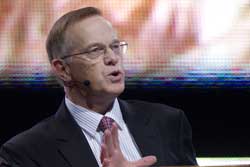As a gift to the table group leaders, there was no early morning meeting for us, which meant an extra hour of sleep for some weary bodies (including mine), which was much appreciated.
The first plenary session started at 8.30am as usual with some lively singing, with gifted multilingual singers delighting us with a range of languages sung, with the words on the screen enabling us all to join in - of course when the Hebrew words 'Hallelujah' and 'Amen' occur so often in these songs, translation is hardly needed!
Bible Study
Calisto Odede, senior Pastor at Nairobi Pentecostal Church led the Bible study on the lengthy passage from Ephesians 4:17−6:9.
His IFES roots were more evident than any identifiable Pentecostal theology as Odede led us through a passionate and eloquent exposition of this important section of Paul's letter. He challenged all participants, but especially leaders of churches, to walk 'in love' and walk 'in the light' and to leave footprints that honour God in their holiness and edifying the church in their modelling. With illustrations of moral failures among clergy, especially the misuse of money and the manipulation of congregations, Odede gave us food for thought and stirred us to greater faithfulness in our lives. Unfortunately time did not allow any consideration of, apart from a passing reference to, the relationship between husbands and wives or parents and children, but those parts of the passage he did expound he did so with passion and clarity.
Humility, Integrity, Simplicity
The second plenary session tackled the theme of integrity.
Chris Wright from the Langham Partnership opened with a fine address on the importance on integrity, addressing the temptations of power, manipulation of people and the idolatry of covetousness. 
'What hurts God most', he said, 'is not just the sins of the world, but the failure, disobedience and rebellion of those he has redeemed.'
Wright closed his address with three words: humility, integrity and simplicity (using the helpful anagram of HIS).
These fundamental characteristics should be characteristic of all God's people, but especially leaders. He reminded the Congress that as we take the word of the gospel to the world we must also take with us words of confession to God, and before we get out of our seats to seek the lost, we need to get on our knees to seek the Lord.
Two further talks rounded out this session with Femi Adeleye (Nigeria) providing a clear biblical response to the counterfeit gospel of prosperity and Elke Werner (Germany) speaking on the value of including women in partnerships. This latter address once again reinforced the egalitarian view of partnership without any acknowledgement or existence, let alone value, of the complementarian view of partnership which has been the accepted teaching of the church for 1900 years.
Prayer and praise
The evening session was devoted to our response of prayer and praise to all that we had heard during the Congress. We were encouraged to sit at our table groups (since the evening meetings had unassigned seating) so that we could have an extended time of guided prayer with those with whom we had studied the Bible each morning. This proved to be a further bonding among those who sat at table.
The regional focus was on Eurasia and the Western World. We were reminded that at Lausanne II, there was only a handful of participants from the Soviet Union. At Lausanne III, following the disintegration of the Soviet Union and the emergence of the 12 countries of (the newly coined regional name) Eurasia, we had 120 participants. In 1989 Siberia was a prison state, now it is a mission field! This was an exciting session hearing of God's sustaining his church throughout 70 years of Soviet oppression which is now bearing fruit with many conversions.
Disappointment with “Commitment” process
At the end of the evening we were all given a copy of Part 1 of the Cape Town Commitment. This had been prepared some months before the Congress outlining core values and beliefs of Evangelicals.
Unfortunately due to printing delays the copies were not available until 24 hours before the Congress closed. The Statement Writing Group had been working all week on Part 2 of the Commitment, incorporating most of the ideas that had emanated from the platform, multiplexes or Dialogue meetings. The final completed document (combining Parts 1 & 2) is expected to be available later in the year.
However, I was disappointed with the process. At Lausanne I and II respective draft copies of the Covenant and Manifesto were circulated to participants for comment and feedback with sufficient time for these to be refined and incorporated into the final document, which was adopted by each congress on the last day.
Given the innovative development of Table Groups, the infrastructure was in place for an orderly and simplified process of feedback. But alas, it was not to be. Instead, we received a 'top down' document to which the participants had no input. This was antithetical the nature of the Congress which had lauded the working of Table Groups and had repeatedly stated that the number of presenters was the number of participants"”an active participation rather than a passive one. There was precious little time for people even to read Part 1 of the Commitment before the closing ceremony, which in hindsight is wrongly titled as 'Commitment'. It is not our commitment (we who attended Lausanne); it is the commitment of the Working Group who drafted the document. This break from the well established and highly satisfactory methodology for adopting a congress statement at Lausanne and Manila was disappointing, to say the least.
(Pictures: Lausanne 2010 [url=http://www.lausanne.org]http://www.lausanne.org[/url])





















